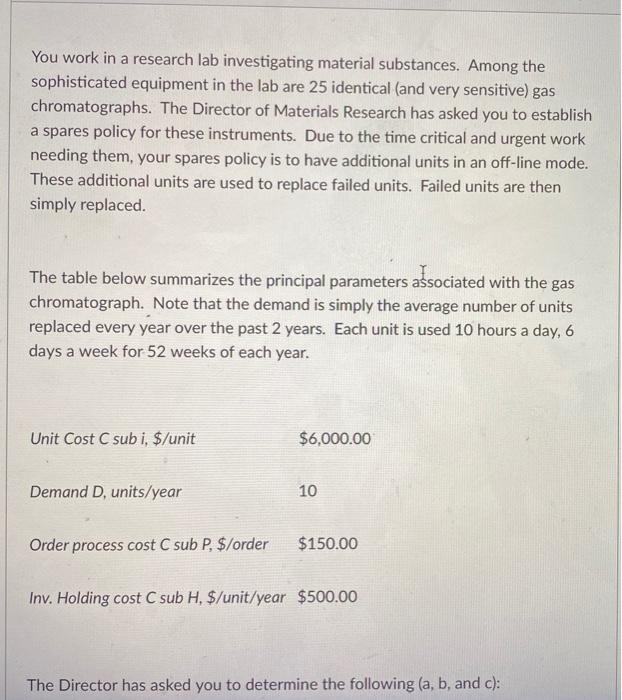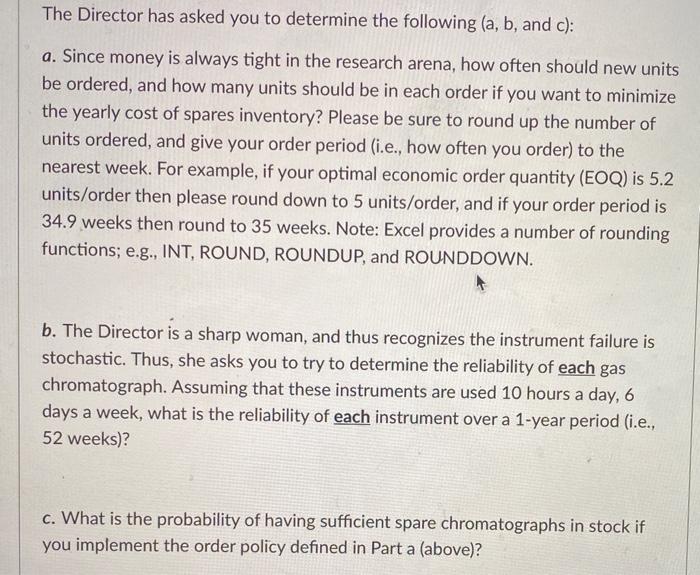You work in a research lab investigating material substances. Among the sophisticated equipment in the lab are 25 identical (and very sensitive) gas chromatographs. The Director of Materials Research has asked you to establish a spares policy for these instruments. Due to the time critical and urgent work needing them, your spares policy is to have additional units in an off-line mode. These additional units are used to replace failed units. Failed units are then simply replaced. The table below summarizes the principal parameters associated with the gas chromatograph. Note that the demand is simply the average number of units replaced every year over the past 2 years. Each unit is used 10 hours a day, 6 days a week for 52 weeks of each year. Unit Cost C sub i. $/unit $6,000.00 Demand D, units/year 10 Order process cost C sub P, $/order $150.00 Inv. Holding cost C sub H, $/unit/year $500.00 The Director has asked you to determine the following (a, b, and c): The Director has asked you to determine the following (a, b, and c): a. Since money is always tight in the research arena, how often should new units be ordered, and how many units should be in each order if you want to minimize the yearly cost of spares inventory? Please be sure to round up the number of units ordered, and give your order period (i.e., how often you order) to the nearest week. For example, if your optimal economic order quantity (EOQ) is 5.2 units/order then please round down to 5 units/order, and if your order period is 34.9 weeks then round to 35 weeks. Note: Excel provides a number of rounding functions; e.g., INT, ROUND, ROUNDUP, and ROUNDDOWN. b. The Director is a sharp woman, and thus recognizes the instrument failure is stochastic. Thus, she asks you to try to determine the reliability of each gas chromatograph. Assuming that these instruments are used 10 hours a day, 6 days a week, what is the reliability of each instrument over a 1-year period (i.e., 52 weeks)? c. What is the probability of having sufficient spare chromatographs in stock if you implement the order policy defined in Part a (above)? You work in a research lab investigating material substances. Among the sophisticated equipment in the lab are 25 identical (and very sensitive) gas chromatographs. The Director of Materials Research has asked you to establish a spares policy for these instruments. Due to the time critical and urgent work needing them, your spares policy is to have additional units in an off-line mode. These additional units are used to replace failed units. Failed units are then simply replaced. The table below summarizes the principal parameters associated with the gas chromatograph. Note that the demand is simply the average number of units replaced every year over the past 2 years. Each unit is used 10 hours a day, 6 days a week for 52 weeks of each year. Unit Cost C sub i. $/unit $6,000.00 Demand D, units/year 10 Order process cost C sub P, $/order $150.00 Inv. Holding cost C sub H, $/unit/year $500.00 The Director has asked you to determine the following (a, b, and c): The Director has asked you to determine the following (a, b, and c): a. Since money is always tight in the research arena, how often should new units be ordered, and how many units should be in each order if you want to minimize the yearly cost of spares inventory? Please be sure to round up the number of units ordered, and give your order period (i.e., how often you order) to the nearest week. For example, if your optimal economic order quantity (EOQ) is 5.2 units/order then please round down to 5 units/order, and if your order period is 34.9 weeks then round to 35 weeks. Note: Excel provides a number of rounding functions; e.g., INT, ROUND, ROUNDUP, and ROUNDDOWN. b. The Director is a sharp woman, and thus recognizes the instrument failure is stochastic. Thus, she asks you to try to determine the reliability of each gas chromatograph. Assuming that these instruments are used 10 hours a day, 6 days a week, what is the reliability of each instrument over a 1-year period (i.e., 52 weeks)? c. What is the probability of having sufficient spare chromatographs in stock if you implement the order policy defined in Part a (above)








